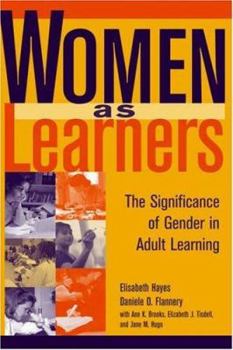Women as Learners: The Significance of Gender in Adult Learning
"This thorough and up-to-date exploration of women's learning is a much needed addition to the field of adult education. The authors' refreshingly engaging style renders complex theoretical material accessible to scholars and practitioners alike. While theories and research on women's learning are situated in the broader context of adult learning, the authors never lose sight of what it all means for the teaching/learning transaction." --Sharan B. Merriam, Department of Adult Education, The University of Georgia "An impressive case for why women's experiences of education should receive the attention of educators, developmental psychologists, social theoreticians, and policymakers. In the process of making their case, the authors challenge many of the assumptions that underlie popular gender-blind adult learning theories. They demonstrate how often social context, culture, and the politics of power are ignored in educational theory and practice to the detriment of women learners. They delve into personal narratives to 'give voice' to the fears, aspirations, rebellions, and transformations that accompany women's educational journey.... In an era in which women constitute the majority in higher education, we sorely need a comprehensive map such as Women as Learners to broaden our horizons. I applaud this book " --Nancy Goldberger, psychology faculty member, The Fielding Institute, and coauthor of Women's Ways of Knowing Here, at last, is a volume that explores and analyzes learning as a distinctive experience for women. The authors are all established adult education professionals and recognized authorities on women as adult learners. Together, they examine and compare the importance of such factors as sense of identity, self-esteem, social world, and power in what and how women learn. Drawing from extensive research and scholarship, as well as from personal stories, they reveal the numerous ways in which women experience the learning process. They explain, for example, how women often become personally connected to the object and process of learning. They also analyze these different experiences to show education and training professionals how to better design and conduct programs for women. Women as Learners offers specific recommendations to improve all types of formal and informal adult educational programs, including literacy education, counseling and support groups, workplace training, and professional development activities. Concise yet comprehensive, this long-awaited book provides the most current principles for practice.
Format:Hardcover
Language:English
ISBN:0787909203
ISBN13:9780787909208
Release Date:March 2000
Publisher:Jossey-Bass
Length:304 Pages
Weight:1.35 lbs.
Dimensions:1.0" x 6.3" x 9.3"
Customer Reviews
1 rating
Urgently Needed Perspectives
Published by Thriftbooks.com User , 24 years ago
In the Preface, the authors explain that this book "is intended to address the prevailing lack of information and understanding about adult women's learning and education....Changing social and economic factors have led to tremendous growth in the number of women who are participating in formal and informal learning activities....This book uses a feminine perspective as the organizing framework for the book's contents and as a standpoint from which to assess the current [i.e. 2000] understanding of women's learning." The authors identify several "key assumptions" and then explain in greater detail what their purposes are. (There are four.) The material is carefully organized and developed within nine chapters. The first sets the scene. Chapters Two through Six "explicate the major themes associated with women's learning." In Chapter Seven, the focus shifts to several feminist pedagogies. In Chapter Eight, the reader is asked to consider the implications of what has been presented thus far. The final chapter addresses other implications: those for urgently-needed and expanded future research and scholarship on women's learning. Then in a Postscript, the authors (in effect) congratulate women on what they have accomplished thus far and then challenge them to believe in their ability to achieve even more.Who will derive the greatest benefit from this book? Certainly those responsible for planning and conducting executive education programs in which women participate. Also, those participants. Finally, those who agree with the authors (as do I) that responsible and rigorous research and scholarship on the education of women has (in Paul Williams' words) "only just begun." One of my favorite passages is provided in the Postscript when the authors urge their reader to "journey into learning" and suggest three companions ("sister travelers") from Native American folklore: The Old Spider Woman who is the Great Mother ("creator, weaver, tender of the fires of life"), the Seeker Woman who is a guide for women on a journey into the unknown (providing "consciousness and enlightenment, insights and intuition, and unmasking, which reveals inner truth"), and the Woman of Knowledge who who serves as a guide for "turning things upside down on our learning journeys, for looking and listening and feeling and thinking with different eyes." In fact, anyone (indeed everyone) now preparing to to embark on or already involved in a "journey" to achieve knowledge and (hopefully) wisdom should have all three as companions. Faith, Curiosity, and Courage are obviously not gender-specific.





